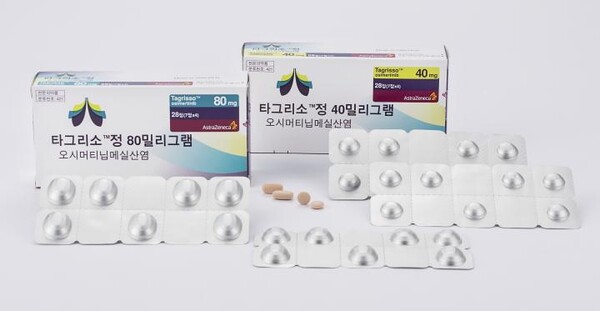AstraZeneca Korea's lung cancer drug Tagrisso (osimertinib) has passed the Drug Reimbursement Evaluation Committee, taking a step closer to expanded coverage for first-line lung cancer treatment.

The Health Insurance Review and Assessment Service (HIRA) held the 10th committee meeting on Thursday and determined that it was appropriate to expand Tagrisso's benefits.
It has been six months since HIRA’s Cancer Disease Review Committee set the Tagrisso’s benefit standard as "first-line treatment for patients with locally advanced or metastatic NSCLC with EGFR exon 19 deletion or exon 21 (L858R) substitution mutation" in March.
With the approval, Tagrisso will be covered as a first-line treatment for lung cancer, subject to future price negotiations with the National Health Insurance Service and the Health Insurance Policy Review Committee of the Ministry of Health and Welfare.
Tagrisso is a third-generation EGFR TKI developed by AstraZeneca, which was listed in health insurance as a second-line treatment for NSCLC in 2017 and was approved as a first-line treatment by the Ministry of Food and Drug Safety in 2019.
Patient organizations have been demanding the expansion of Tagrisso's first-line treatment benefits. Still, negotiations with the government have been difficult, and the timing of first-line coverage has been delayed. With the drug review committee's passage, the primary benefit is expected to be expanded within the year.
The industry also pays attention to how Tagrisso widens the gap with Yuhan Corp.'s third-generation EGFR TKI Lekraza (rasutinib), recently approved for first-line lung cancer treatment.
Meanwhile, the committee also recognized the appropriateness of new reimbursement for three drugs -- AstraZeneca's neurofibromatosis drug Koselugo Capsules (selumetinib sulfate), Novartis' inherited retinal disease drug Luxturna Inj (voretizine neparvovec), and GlaxoSmithKline's (GSK) severe eosinophilic asthma drug Nucala (mepolizumab).
Regarding Pfizer Korea's multidrug-resistant bacterial infections, Zavicefta Inj (ceftazidime-avibactam) and Bosulif Tab (bosutinib monohydrate) for chronic myeloid leukemia, it determined the appropriateness of salaries at or below the appraised value.
On the other hand, AstraZeneca Korea's treatment for severe eosinophilic asthma, Fasenra Pfs Syringe Inj (benlarizumab), suffered a setback as it was determined to be non-payable.
Related articles
- [Reporter’s notebook] What the government misses by not reimbursing Tagrisso
- [ASCO 2023] Tagrisso shows ‘breakthrough’ benefit in early lung cancer
- AZ’s Tagrisso broadens treatment options for EGFR-mutant lung cancer
- Tagrisso vs. Leclaza – let the best drug win
- [Interview] Tagrisso offers a new option for 1st-line treatment of stage 4 lung cancer
- AstraZeneca Korea appoints Chon Se-whan as Country President
- BeiGene's anticancer drug Brukinsa to get expanded insurance coverage

